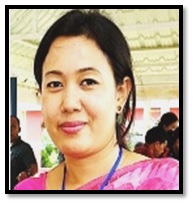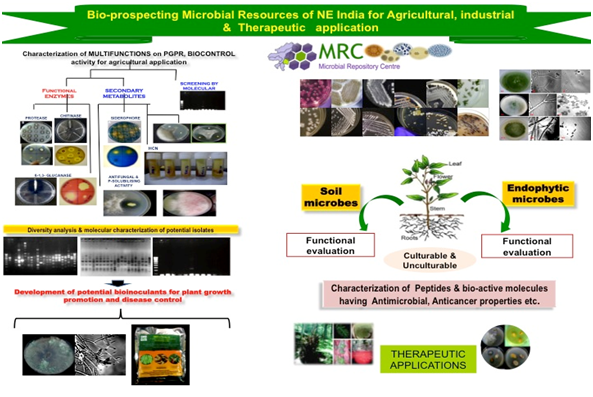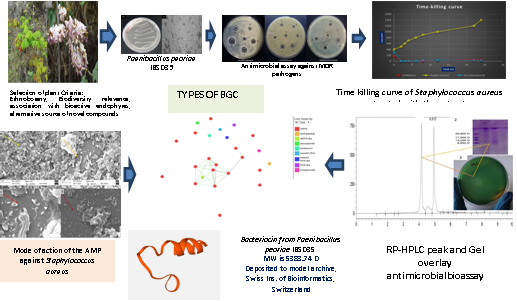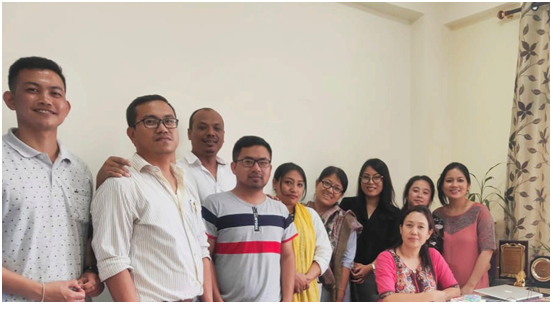
Sarangthem Indira Devi
Microbial
Scientist Name: Sarangthem Indira Devi, Ph.D
Designation/Position: Scientist-F
Department/Programme Name: Microbial Resources Division
Phone: 0385-2446122, Ext: 204
Academic Qualifications :
• 2013-2014, Post-Doctoral, Washington State University, Pullman, USA
• 1999-2003, Ph.D, Chaudhary Charan Singh University (Meerut University) Meerut, India
• 1997-1998, M.Sc Microbiology, Chaudhary Charan Singh University, Meerut, India
• 1994-96, B.Sc Microbiology, Mysore University, India
Experience :
• 2017 January – till date, Scientist-D, IBSD, DBT, Takyelpat,Imphal, India
• 2013-2016, Scientist-C, IBSD, DBT, Takyelpat,Imphal, India
• 2008-2012, Scientist-B, IBSD, DBT, Takyelpat,Imphal, India
• 2004-2007, Scientist-B (Contract), IBSD, DBT, Takyelpat,Imphal, India
Awards & Fellowships :
|
Name of Honor/Award |
Awarding Agency/ Institute |
Year |
|
Newton-Bhabha Fund award: UK-India programme for women in plant and crop sciences on the Female Leadership in Crop and Agricultural Sciences, September 2016. Cambridge University, UK
|
Cambridge University, UK |
2016 |
|
Department of Biotechnology, Govt. of India |
2014 |
|
|
All India Microbiologist Association |
2013 |
|
|
Department of Biotechnology |
2013 |
|
|
Department of Biotechnology, Govt. of India |
2012 |
|
|
All India Microbiologist Association |
2010 |
|
|
Department of Science and Technology, Govt. of India |
2009 |
|
|
Meerut University |
1998 |
Memberships (Professional Associations / Societies)
• Life member of Association of Microbiologist of India (AMI)
• Life member, Indian Phytological Society
• Member of American Society of Microbiology (ASM)
PhD’s Guided:
|
Sl No. |
Name of the Ph.D student |
Study period
|
Title of the thesis |
University |
|
1 |
Takhelmayum Phazna Devi (Awarded)
|
2012-2018 |
Analysis of rhizosphere micro-biota in King Chilli (Umorok) of NE India and its impact on plant health |
Gauhati University |
|
3 |
Ng Ngashangva (Pre-Thesis submitted) |
2013-2019 |
Isolation and characterization of bioactive metabolites from the endophytes of traditionally used medicinal plants in North East India |
Gauhati University |
Specialized Training:
(I) Two months visiting fellowship program on “Microbial Diversity Analysis and Characterization of antimicrobial encoding genes from microbial origin” from 1st Feb to 30th March, 2009 in MKU, Madurai, Tamil Nadu
(II) National training programme on Recent Advantances in “Expression Genomic Techniques” held at NDRI, Karnal, Haryana from 20th Feb. to 10th March, 2007.
(III) National training programme on “Biochemical and Molecular Characterization of Agriculturally important microorganisms” at National Bureau of Agriculturally important Microorganisms (NBAIM) from 20th to 29th April, 2005, Mao, U.P., India.
(IV) Training workshop on “Integrating IPR culture with R & D“. & Regional Seminar on “Energy Scenario of Patent protection, Valuation & Commercialization” from 15th to 16th Feb., 2006.
Research
1. Research theme photo

2. Verticals involved
Microbial Resources
3. Research Area/Research Expertise
· Microbial Diversity and Microbial Biotechnology
· Microbial peptides and bioactive molecules against AMR and MDR pathogens
· Agricultural Microbiology
· Proteomics Genomics
· Characterization of Industrial enzymes from Microbial Resources
4. Research Summary
A. CurrentResearch:
Exploration and microbial diversity study from different unexplored ecological niches of NE IndiaCharacterization and functional evaluation of the microbial populations for their possible utilization in agriculture, industrial and therapeutic applications
- NE region of India creates a wide array of habitats owing to its varied climate and diverse topographical conditions that support unique sets of microorganisms, which could be of immense economic and commercial value. Considering the current rapid anthropogenic changes in the environment and to protect from the excessive wild harvest, adequate ex situ preservation and maintenance of these microorganisms is indispensable for future research, development and applicationsinagricultural, industrial and therapeutic applications. Therefore, Microbial Repository Centre of IBSD has a total collection of approx. 65000bacterial and fungal cultures isolated from different unique ecological niches of NE India such as caves, hot spring, cold spring, high altitudes, sacred forest, fermented foods and beverages, lakes, forest, endophytes, epiphytes, mushrooms, and untouched ecosystems collected from the northeastern states of India. Molecular characterization and identification of these microbial isolates is under study. Screening of the functional activity for antimicrobial resistance and industrial enzymes is under process.

- As a part of the endophytic study, Paenibacillus peoriae IBSD35 isolated from a medicinal plant Piscidia sp., have shown broad-spectrum of antimicrobial activity against the representative test pathogensviz.E. coli ATCC 25922, Candida ablicans ATCC 10231 and Staphylococcus aureus ATCC 25923. BGCs were predicted from P. peoriae IBSD35 with AntiSMASH analysis. The activity remains stable even after treatment with degradative enzymes, detergents, and inorganic solvents. The enzyme was subjected to LC-MS analysis and confirmed the presence of predicted secondary metabolites and antibiotics gene clusters. The antimicrobial peptide was identified as 35.5 % similarity to Sakacin P (bacteriocin) with a molecular weight 5383.74 D. Moreover, from the KEGG pathway database analysis it confirms that the genome harbours type II polyketide biosynthesis which synthesized products like Dihydrokalafungin, oxytetracycline, tetracycline, nogalavinone, elloramycin and tetranomycin F. Further analysis and pathway study for the above enzyme is under process.It can be used as future antibiotics and foof preservatives

- Screening and characterization of industrially important enzymes from bacteria and fungi.
- Exploration and characterization of wild mushrooms from different districts of Manipur including a giant edible wild mushroomand screening of their nutritional and antimicrobial activity. Development of edible wild mushroom production technology.
B. Previous Notable Research:
· Characterized potential rhizosphere Trichoderma sp. diversity and bacteria having PGPR and biocontrol properties against soil and seed borne pathogens
· Charcterized antimicrobial peptides and bioactive metabolites against AMR pathogens from endophytes and soilmicroorganisms.
Publications:
Selected Research Articles
- Sahoo D, Jusna N, Ngashangva N, Momota P, Rojeena Y, Indira S* 2019. Draft Genome Sequence of Arthrobacter globiformis mrc11, an Antimicrobial Agent Isolated from a Khangkhui Cave Deposit. Microbial Resource Announcement. 8: Issue 11. DOI: http://doi.org/10.1128/MRA.01620-18. PMID: 30938326 IF:
- Phazna TA, Sahoo D, Indira S*, M.C Kalita, S Aravind 2019. Rhizobacterial isolates of Capsicum chinense inhibited fungal pathogen Rhizoctonia solani. International Journal of Scientific Research. 6:112-117. DOI: https://doi.org/10.26438/ijsrbs/v6i1.112117.
- Phazna TA, Sahoo D, Aravind S. Chandradev S, Indira S 2019.Bacterial rhizosphere community profile at different growth stages of Umorok (Capsicum chinense) and its response to the root exudates. Int Microbiol (2019). https://doi.org/10.1007/s10123-019-00097IF: 1.26
- Melissa LT, Marshall JM, Cliff JB, Boasal RF, Dohnalkova AC, Dmitri M, Indira S, Olga VM, James B.H, David MW and Linda ST 2018. Phenazine-1-carboxylic acid and soil moisture influence biofilm development and turnover of rhizobacterial biomass on wheat root surfaces. Environmental Microbiology, doi:10.1111/1462-2920.14244. PMID: 29687554ISSN No. 1462-2920 IF- 5.4.
- Momota P, Sahoo D, P.Verma, Verma S, Kalita MC, Indira S*. 2018. Draft Genome Sequence of Bacillus altitudinis Lc5, a Biocontrol and Plant Growth-Promoting Endophyte Strain Isolated from Indigenous Black Rice of Manipur. Genome Announcements. Vol 6, Issue 26, 1-2. PMID: 29954905ISSN No. 2169-8287 IF- 1.2
- Indira S *, Lotjem H, Julia E, Momota P, Ngasangba Ng, J. Bora, Sahoo D, Sharma C. 2017. Biomining of the forest ecosystem of North East India for identification of antimicrobial metabolites from fungi through submerged fermentation. Bioresource Technology. 241: 1168-1172. DOI:10.1016/j.biortech.2017.05.130ISSN No. 0960-8524 IF- 6.67
- Momota P, Indira S*, Sahoo D, Strobel A 2017. Functional Chracterization o Endophytic Fungal Community Associated with Oryza sativa L. and Zea mays L. Frontiers in Microbiology. Vol.8.325. doi:10.3389 /fmicb.2017.00325. PMID: 28303127ISSN No.1664-302X IF- 4.1
- Dubey SC, Tripathi A, Rakesh T, Indira S. 2017. Management of root rot and damping off complex in French bean by biocontrol agents. Indian Phytopath. 70 (3): 388-390 (2017) DOI 10.24838/ip.2017.v70.i3.72500 IF: 0.23
- Kamala Th, Indira S *, Sharma K. C and Kennedy K 2015. Phylogeny and Taxonomical Investigation of Trichoderma spp. from Indian Region of Indo-Burma Biodiversity Hotspot Region with Special Reference to anipur. BioMed Research International. Vol. 15. Article ID 285261. PMID: 25699268ISSN No. 2169-8287 IF- 2.5
- Paul P, Roy S, Sarkar S, Chowdhury S, Dutta RN, Raghavaiah PP, McArdle P, Dev L, Indira S. 2015. Synthesis, structure and properties of a manganese (II) benzoate containing diimine. Journal of Molecular Structure 1102. 153-160. https://doi.org/10.1016/j.molstruc.2015.08.049 ISSN No. 0022-2860 IF- 1.7
- Kamala TH, Indira S*, Gourshyam Th, Bharat, G.S. 2013. Genetic diversity and species pattern of Trichoderma and Hypocrea in Manipur using in-silico analysis. Bioinformation, 9(2), 106-111. PMID: 23390355ISSN No. 0973-2063 IF-1.0
- Devi R, Rana VS, Indira S. 2013. Mercedes Verdeguer and Maria Amparo Blazquez. 2012. Chemical composition and antimicrobial activity of the essential oil of Curcuma leucorhiza Roxb. Journal of Essential Oil Research, 24(6), 533-538. DOI: 10.1080/10412905.2012.728089 ISSN No. 1041-2905 IF- 1.0
- Kamala T, Indira S* 2012. Biocontrol properties of indigenous Trichoderma isolates from NE India against Fusarium oxysporum and Rhizoctonia solani. African J of Biotechnology, 11(34):8491-8499. DOI: 10.5897/AJB11.1938ISSN No. 1684-5315 IF-0.8
- Indira S*, Bharat S, Momota P, Talukdar NC. 2012. Genetic characterization of Burkholderia cepacia strain from Northeast vIndia: A potential bio-control agent. Advances in Bioscience and Biotechnioogy, 3, 1179-1188. http://dx.doi.org/10.4236/abb.2012.38144ISSN No. 2156-8456 IF-0.6
- Indira S, Talukdar NC, Sharma C, Rohinikumar M 2011. Screening rhizobacteria for their plant growth promotion ability and antagonism against damping off and root rot diseases of broad bean (Viciafaba L.). Indian Journal of Microbiology, 51(1):14-21(Springer). PMID: 22282623 ISSN No-004-8991 IF-2.9
- Kamala TH, Indira S* 2011. Evaluation of indigenous Trichoderma isolates from Manipur as biocontrol agent against Pythium aphanidermatum on common beans. 3Biotech. 1: 217-225. Springer. PMID: 22558540ISSN No. 2190-5738 IF- 1.3
- Indira S, Vashista P, Sharma CB. 2005. Purification to homogeneity & Characterization of the antifungal protein from the roots of Arachies hypogeae L., National Academy of Science Letters, vol.28, No. 1&2. ISSN No. 2250-1754IF:0.6
A. Review Articles:
1. Kamala TH and Indira S* 2012. Prospect of Trichoderma as a potential fungicide. Int. Journal of Human Genetics Medical Biotech and Microbiol. Studies, 1(3), 1-10. ISSN No. 0972-3757
B. Book Chapters :
1. Indira S, Momota P. 2015. “Plant –Endophyte Interaction and Its Unrelenting Contribution Towards Plant Health” in Plant Microbes Symbiosis: Applied Facets. Chapter7, page 147-162, Springer, IndiaDOI 10.1007/978-81-322-2068-8_7

Group Members (Details):
|
1. |
Ng.Ngashangva, SRF-DBT PhD student Email: ngashangva.ng@gmail.com Problem addressing: Since patogenic microorganisms become resistant to the existing antibiotics therefore alternative AMR drug or bioactive molecules are required to produce. Expected outcome: Characterization of antimicrobial peptide from endophytes against AMR pthogens |
|
|
2. |
Joshua Khumlianlal PhD student Email: joshualangel1@gmail.com Problem addressing: Mushroom are highly nutricious food but wild edible mushrooms have not been exlpored which are used by the tribals for mass multiplication . Expected outcome: Diversity study of wild edible mushroom in Manipur and its mass multiplication |
|
|
3. |
Surmani Huidrom PhD student Email: surmanihuidrom@gmail.com Problem addressing:To tackle the emerging antibiotic resistant bacteria such as MRSA and VRE by using lactic acid bacteria producing antimicrobial peptide baceriocin as alternatives to antibiotic Expected outcome: Characterization of lactic acid bacteria producing bacteriocin having antimicrobial activity and tyrosinase inhibitor activity for probable application as antibiotics, skin care products and food preservatives |
|
|
4. |
Name, Technical Officer/Lab Technician etc K.Chandradev Sharma Senior Technical-1 (Microbial Resources Division), IBSD Core staff Email: schandradev@yahoo.in
|
|
|
5. |
Wahengbam Rakesh Singh Laboratory assistant (Microbial Resources Division), IBSD Core outsourced staff Email: rakheshwahengbam@gmail.com |
|
|
Project staffs |
||
|
1. |
Dr. Akoijam Chingkheihunba Research Associate (DBT project staff) Email: chingkhei15@yahoo.com Project title: (Microbial Culture Collection Centre) |
|
|
2. |
Dr. Jayalaxmi Ningthoujam Research Associate (DBT project staff) Email:chingkhei15@yahoo.com jayaningthoujam255@gmail.com Project title: (Microbial Culture Collection Centre) |
|
|
3. |
Rajkumari Lynda Technical assistant (DBT project staff) Email: rajkumari.lynda@gmail.com Project title: (Microbial Culture Collection Centre) |
|
|
4. |
Nandeibam Jusna Technical assistant (IBSD outsourced staff) Email: Anku.just.bt4u@gmail.com Project title: (Microbial Culture Collection Centre) |
|
|
5. |
Yambem Rojeena Laboratory assistant(DBT project staff) Email: Rojeena123@gmail.com Project title: (Microbial Culture Collection Centre) |
|
|
6. |
Pukhramam Ronand Singh Data Entry Operator (DBT project staff) Email: ronand.singh@gmail.com Project title: (Microbial Culture Collection Centre) |
|
|
7. |
Leichombam Mohindro Singh SRF (IBSD project staff) Email: mohinlei@gmail.com Project title: (Study of persistence of Japanese Encephalitis in reservoir host) |
|
Research Grants/Projects
A. Core/Internal
a. Present:
|
Sl. No. |
Duration (From-To) |
Title of Project/ Grant |
PI/Co-PI |
Funding Agency |
|
1 |
2008-till date |
Bio-prospecting of Microbial resources of North East India for agricultural, therapeutic and industrial applications |
PI |
IBSD |
B. Extramural:
a. Present:
|
Sl. No. |
Duration (From-To) |
Title of Project/ Grant |
PI/Co-PI |
Funding Agency |
|
1 |
Nov. 2017-August 2020 |
Establishment of a Culture collection Centre in North East region of India Phase II |
Co-PI |
DBT |
Past:
|
Sl. No. |
Duration (From-To) |
Title of Project/ Grant |
PI/Co-PI |
Funding Agency |
|
1 |
DBT-RGYI Started in March, 2011-2015 |
Bio-prospecting of endophytic microorganisms from cereal crops of NE India as potential bio-inoculants in sustainable agricultural practice. |
PI |
DBT |
|
2 |
DBT-Twinning project Started in December, 2011-15 |
Screening of antimicrobial peptides &bio-active molecules from microbial diversity of forest ecosystem of NE India: A potential approach for development of antibiotics against multidrug resistance pathogens. |
PI |
DBT |
|
3 |
DBT-Individual project Stated in November, 2011-14 |
Bioprospecting of indigenous Trichoderma& Pseudomonas strains from NE India as potential bioinoculant with increase shelf-life & better biocontrol efficacy. |
PI |
DBT |
|
4 |
DBT-Net working project Started in 2012-16 |
Development of suitable formulation using indigenous strains of NE India for crop improvement: A combined holistic approach. |
PI |
DBT |
|
5 |
DBT- September 2012-16 |
Establishment of a Culture collection Centre in North East region of India |
Co-PI |
DBT |
